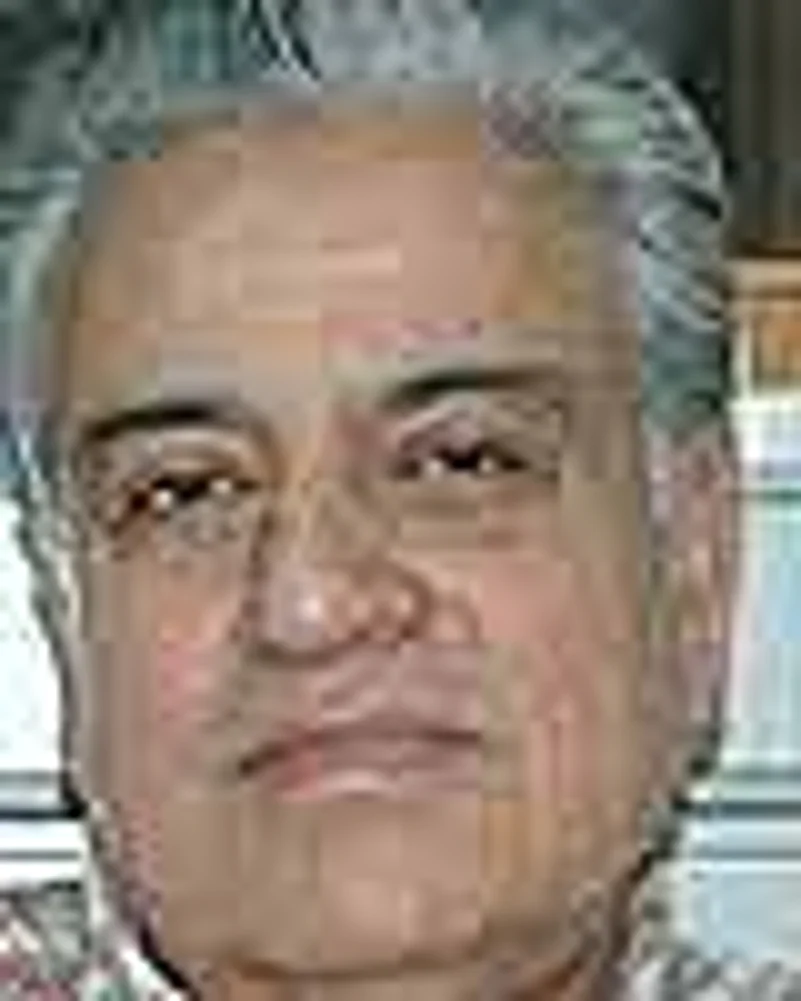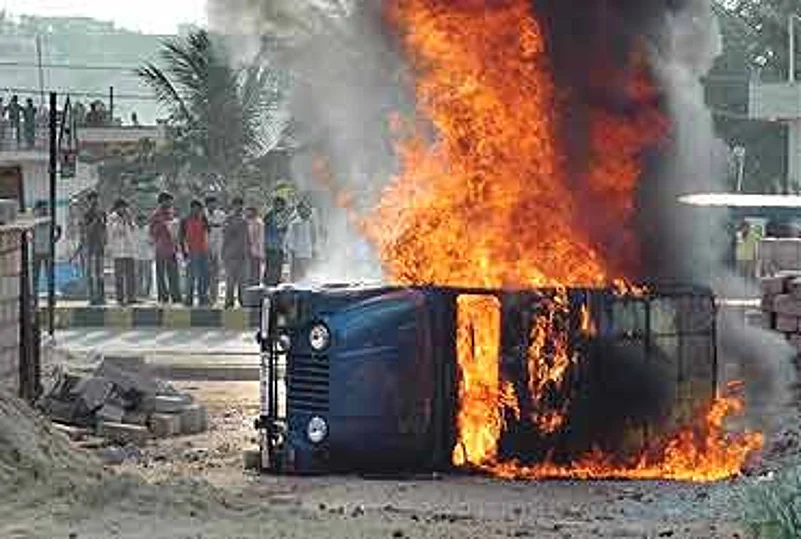The transcript of the BBC Hindi special programme Aapki Baat BBC Ke Saathwith former Cabinet Secretary TSR Subramanian and former chief of Delhi FireServices, S.K. Dheri in wake of the recent fire in Meerut that killed 42, andthe rioting and violence following the death of actor Rajkumar in Bangalore.
Nagendar Sharma: Is there some way to prevent innocent people from being killed in publicplaces due to accidents and acts of terror?

T.S.R. Subramanian: The Meerut incident was really an unfortunate thing to havehappened. Natural tragedies can happen anywhere in the world, whether it beAmerica, Germany, Japan or India. Just recently a terrible accident happened inAustria, for example. These things can happen, but the problem is that man-made tragedies arecommon in India and we are not prepared to handle them. The preventive steps whichshould be taken are missing. That is the cause for worry.

S. K. Dheri: Incidents like Meerut would keep on happening in ourcountry. I am sorry to say this for the simple reason that we do not want to learn anylesson after any incident, whether big or small. After Mandi Dabwali fire, in which hundreds of children were burnt along withsome parents, we had drawn up comprehensive guidelines in Delhi. We hadexplained which type of cloth should be used for putting up tents, where shouldthe location of kitchens be, the placing of exit and entry points, and theirnumbers, the kind of electricity wiring to be done and so on. Today, I can say withsatisfaction that since these guidelines were adopted in Delhi, no major fireaccident has taken place. I am not ready to believe such accidents would nottake place in future as mistakes arebound to happen. What is required is urgent preventive measures in the first placeand corrective measures in the second.
Nagendar Sharma: Mr Dheri, you have claimed that no major fire incident has taken placein Delhi due to comprehensive guidelines, but critics say wherever suchaccidents have been averted, it has been mainly by chance and pure luck -- the fireauthorities have had little to do with such chance successes.
S. K. Dheri: Well, the problem is that fire safety is not in the concurrentlist, it remains a state subject under the Constitution and that is why althese doubts arise. Now, various state governments have their own ways of dealingwith fire safety. In some places, it is under municipalities, while in some itis under civil defence, at some places it is under the police and yet in someother states it is directly under the state government. Till the time there isuniformity in training and service, clarity in functional rules and clearlegislations, fire safety would continue to be a neglected area of governance.
Listener from Madhya Pradesh: Why is it not made compulsory to havemandatory fire safety checks before erecting tents (pandals) for publicfunctions and marriages? Why are there no specialised departments to check thisto avoid mass scale death and destruction due to mismanagement?
S. K. Dheri: In my view, multiplicity of authorities in any event wouldonly complicate matters and such an inspector raj would lead to more corruption. Whatis required is that the building authorities or the municipalities, which givepermission or no-objection certificate for putting up pandals, should have a freehand. Laws exist, it is a case of implementation. Now, the present fire safety lawsstate that anyone seeking permission for putting up a pandal for a function ormarriage is bound to give a written undertaking that all safety rules would becomplied with, but, despite that, organisers do not comply. Also, it is the generalpublic which should also come forward. How many of us are serious about fire safety? It is easyto blame the administration for any mishap, and our expectations from theadministrative machinery are very high, which is not able to cope with the workload.

T.S.R. Subramanian: There have been two incidents in the recent past which canbe taken as examples. First, the fire in Meerut and secondly, the public outrageat the death of Kannada actor Rajkumar. Both these situation were such where the administration should haveunderstood the public sentiments, should have made all attempts to have appearedsympathetic in word and action, and should have tried to pacify the surchargedatmosphere.
In Meerut, I am not defending the local administration, what waswrong and who should take the blame would be clear when the inquiry report comesout. But there is another aspect related to Meerut, which is by an large forgotten.It was a fair organised in collaboration with big industry bodies such as FICCIand ASSOCHAM. We are living in an age of rapid privatisation, may I ask what didthese big names do after the incident had taken place? Did they try to share thegrief of victim families? Why did they not ensure world-class safetyregulations when they talk of making the country world class? It is notfair that private houses reap huge profits and administration take all the blame.This should also be kept in mind before we attack the administration.
Listener from Meerut: How long would we keep on debating thecauses of Meerut, Uphaar Cinema tragedy or Mandi Dabwali fire? What are the lawmakers doing? We in Meerut, after this incident, have a feeling that corruptioncontinues to destroy the country and nobody is bothered about the common man andhis safety.
T.S.R. Subramanian: The anger of the people of Meerut is absolutely justified,but I fear the solution is not easy nor is it straightforward, the reason beingthat corruption has permeated into our system to a level where nothing seemspossible. In the political class, from the very top right down to grassroots,corruption is the only thing which is uniform. Now we keep on shouting that itshould be eradicated, but just spare a thought and think whether is it possible.
Who would like to root out corruption? I can say from my administrativeexperience: nobody. Neither the political class, nor the bureaucracy, norjudiciary or business class – none of them is interested in removingcorruption as all of them collectively benefit from it. If the faith has to berestored, then in a case like Meerut, exemplary punishment must be given tothose responsible for claiming more than 50 innocent lives and this shouldhappen within a six month period, so that the public of the country does notfeel deceived. Accidents cannot be stopped from happening, but by concretepreventive measures, we can certainly bring their number down, which seems atall order right now.
Listener from Lucknow: Are there existing laws on fire safety in thecountry? If there are, how are these implemented as common man does not knowanything about such laws?
S. K. Dheri: There are laws, and so far as Meerut is concerned, I wouldnot like to comment on the blame part, as the probe is on, I would like to waitfor its outcome. But so far as the incident is concerned, the syntheticmaterial used for putting up pandals was the one which has come up recently,especially after private sector has started showing interest in public fairs.This material was used to keep the air-conditioning effective. I find manysimilarities between Meerut and Mandi Dabwali fire, where I had worked withthe CBI as an expert. In both places, the exit gates were too few and faulty. In bothcases, majority of dead bodies were found near the gates, whichproves that people were trying to rush out in panic. In both places, the material used for pandals appears similar. With all this,there is no doubt left that we are not learning any lessons. In Delhi, a firebrigade is stationed outside a function venue or even at a rally venue, even ifthere is no danger of fire. It is a preventive measure. You asked about rules,well, the rules even say that you can pay to have a fire brigade stationed outside thepandal. How many people do it? It is thought better to spend a few more lakhson the marriage, than spending a few hundreds on fire safety.
Listener from UP: We are talking about safety of common man, and in thiscontext, I would like to know that the latest bomb blasts in Delhi's Jama Masjidshow our administration, security forces and intelligence agencies in poorlight. Those who are expected to anticipate are found wanting. Why?
T.S.R. Subramanian: In Kashmir and some other parts of the country,terrorism levels have been on a rise, and the same is true for some other partsof the world also. I agree with you that is a worrying sign. However to saythat quality of our intelligence agencies is low is not correct. We have highquality intelligence network, the problem is in the area of anticipatoryintelligence to prevent the acts of terror from taking place. The reason forthis is the lack of coordination between central and state intelligenceagencies. I would give you an example – in parts of Bihar, Chattisgarh andOrissa the naxal attacks have been on the rise – to an extent that in somecases naxalites have got over 12 hours of free run at remote police stations,before the armed forces could arrive. Now this has been because of the absenceof anticipation on the part of our intelligence agencies and there is a lot ofscope of improvement in this area.
Listener from Patna: Disasters would keep on happening, be they man-made or natural. Why has the administrative machinery failed so far in educatingthe public about these?
S. K. Dheri: This is a very good point. Public education on disastermanagement, whether natural or man-made – has been somehow missing thepriority list in our country. Today 96 percent of the country's population iscovered by media – radio/TV/cableTV/newspapers. Now this is an area where themedia can play a very important role in making the people aware about theirsafety if a disaster strikes. For example – Uttaranchal government in recentyears has taken good initiatives in earth-quake awareness programmes right uptovillages with its existing tools itself.. Today people in that state know what todo in case a quake hits them. Such initial steps are quite useful in ensuringpeople's safety in the case of any incident.
Listener from Delhi: So much is talked about Kumbhakonam school tragedyin Tamil Nadu, Mandi Dabwali and now Meerut. Why can’t there be a separateministry or department for fire safey?
S. K. Dheri: That there is no attention towards fire safety is not hidden fromanyone. Seventy percent of India lives in villages and fire safety as well asfire brigades are almost unheard of in this vast area of the country. We talk ofcompeting with Europe and rest of the West, which looks like a joke. In thoseparts of the world, fire brigades reach the affected places in three minutes inurban areas and within five minutes in the rural areas. Whereas in capitalDelhi, it takes at least 20-22 minutes for the fire engines to reach the spot.Till the time fire safety is shifted from state list to the central list, and aproper legislation for uniform fire safety rules and regulations is broughtabout, tragic incidents would keep taking place and we would keep discussingthem later on !
Nagendar Sharma: Mr Dheri, you are saying that fire safety is unheard of in ruralareas, but accidents are taking place frequently in urban areas -- for examplein capital Delhi and its surrounding areas, the National Capital Region (NCR), howsafe are these, taking into account the increasing number of high-rise buildingscoming up?
S. K. Dheri: Well, so far as Delhi is concerned, on the basis of population,there should be at least 67 fire stations here, but presently there are only 45.There is a legislation here called the Delhi Fire Safety Act, which has a lot ofprecautionary provisions incorporated in it. However, the real danger is inNational Capital Region, whether it be Gurgaon, NOIDA, Ghaziabad or any otheradjoining region. There are no fire safety regulations here, high rise buildingsboth residential and commercial do not adhere to rules nor do they have firesafety equipments. Strangely, no emergency facilities have been provided in caseof eventualities like fire. Similarly, none of the states under which these NCRtownships fall have any legislation for fire safety. The high rise buildingscoming up at great pace in NCR towns would not be able to cope up with eithernatural or man made disasters.
















